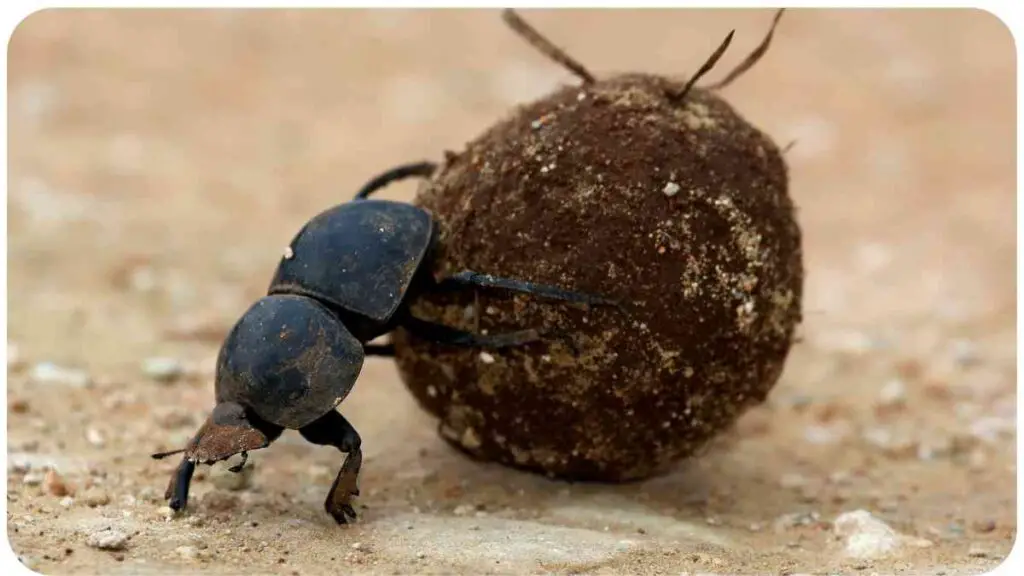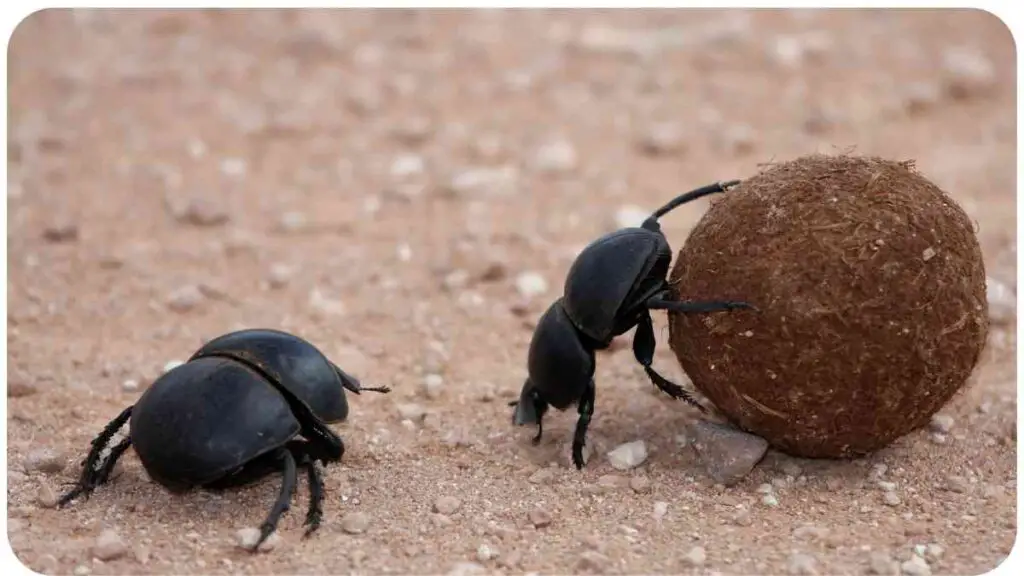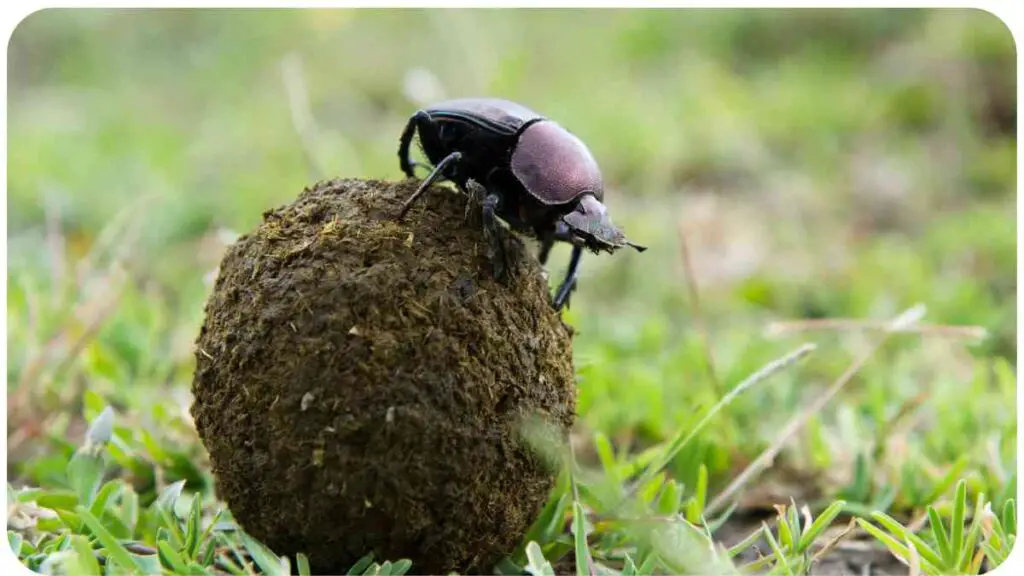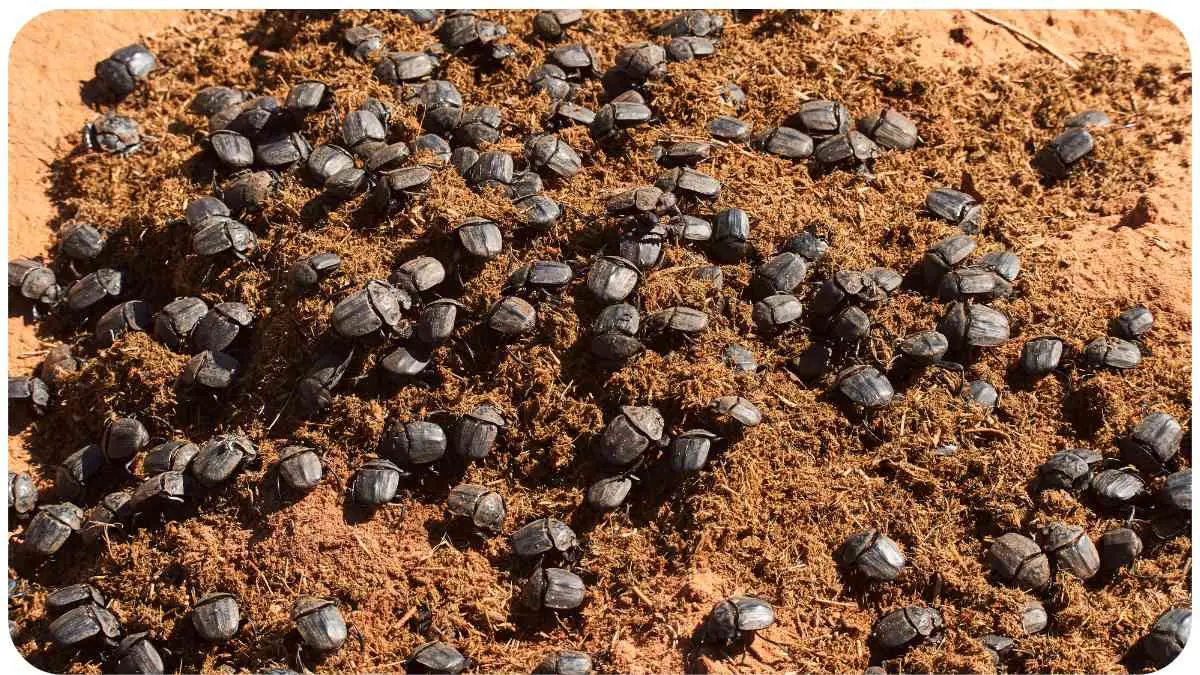Discover the secrets beneath your lawn with our guide to the ecological wonders of dung beetles. Unravel the vital role these beetles play in lawn care, from recycling organic waste to boosting soil health.
This updated article delves into their benefits, addresses misconceptions, and navigates the landscape of Japanese beetles and June bugs. Gain insights on attracting these beneficial insects, managing potential lawn damage, and explore additional tips for a thriving lawn.
Let’s unlock the green magic of dung beetles and transform your understanding of their impact on lawns.
| Takeaways |
|---|
| Dung beetles help break down animal waste and return nutrients to the soil. |
| They also improve soil structure and water infiltration, which can benefit plant growth. |
| Dung beetles are not harmful to humans and do not transmit diseases. |
| To attract dung beetles to your lawn, provide a source of manure or create a healthy lawn with plenty of organic matter. |
| While dung beetles can cause minor damage to lawns, their benefits outweigh any damage they may cause. |
| Controlling dung beetles can be difficult, but physical barriers or removing manure sources can help reduce their presence in certain areas. |
If you’re interested in hydroponics, you may also want to check out our post on How Do You Use Hydroponic Nutrients? Explained to learn about the essential nutrients that plants need to grow in water. Dive into our gardening knowledge base and discover everything you need to know about creating a lush, thriving garden.
Reassessing Dung Beetles: Are They Harmful to Your Lawn?

Dung beetles often face misconceptions, with some wondering if they are detrimental to lawns. In truth, these industrious insects are not bad for the environment; instead, they play a crucial role in recycling organic waste, making them valuable assets to gardens. Many gardeners intentionally welcome dung beetles as they efficiently consume accumulated animal waste.
Common concerns arise from a desire to avoid flies around homes and properties. However, it’s essential to debunk the myth dung beetles exclusively feed on deceased animals and pose no threat to humans.
While their nighttime foraging may generate some noise, their presence contributes positively to the ecosystem, offering an eco-friendly solution to organic waste management. Embrace dung beetles for their environmental benefits, and let go of any unfounded worries about their impact on your lawn.
“Adding clovers to your lawn can provide several benefits, including improved soil health, nitrogen fixation, and weed control. Check out our article on are clovers good for lawn explained to learn more about how this simple addition can benefit your lawn in the long run.”
Culinary Preferences of Japanese Beetles: A Feast on 300+ Plants
Japanese beetles, notorious garden invaders, boast a diverse palate, consuming over 300 plant varieties. Trees, shrubs, and various vegetables fall victim to their voracious appetites. These pests exhibit a penchant for leafy greens but don’t stop there – flowers, fruits, and even roots become delectable offerings.
The adult Japanese beetle takes center stage during the summer, its activity peak. Notably, these pests exhibit a curious attraction to yellow and white flowers, such as tulips. The bright colors of these blooms trigger a peculiar preference, reminiscent of dung.
Understanding their culinary inclinations provides gardeners with insights to protect a wide array of plants from the banquet that Japanese beetles might otherwise embark upon.
Navigating the Menace: The Impact of Japanese Beetles
Japanese beetles, unfortunately, fall into the category of unwelcome guests for lawns, trees, flowers, gardens, and crops alike. Renowned as one of the most destructive pests in North America, these beetles wreak havoc on various plant types, including trees, shrubs, vines, and vegetables.
Their modus operandi involves voraciously chewing on host plant leaves, creating unsightly holes with their mandibles. Beyond mere physical damage, the ingestion of plant tissues adds an extra layer of concern.
Ingesting large quantities of plant tissues over time may introduce toxicity, posing potential risks to the affected plants over the long term. As such, Japanese beetles earn their reputation as adversaries in the garden, necessitating vigilant pest management strategies to safeguard against their destructive tendencies.
“Daisies are not just pretty flowers; they can also be beneficial for your lawn. They help control weeds and attract beneficial insects like bees and butterflies. Check out our article on are daisies good for lawn explained to learn more about how this simple addition can improve the health and appearance of your lawn.”
Banishing June Bugs from Your Home: Practical Solutions
If pesky June bugs have invaded your living space, taking swift and simple measures can effectively address the issue.
Prevention is Key:
- Lights Out, Windows Closed:
- Ensure all lights are turned off, and windows are securely shut to prevent June bugs from entering your home.
Dealing with Indoor Invaders: 2. Water-Based Intervention:
- Spot a June bug indoors? A water spray is a gentle yet effective approach. Liberally spraying water renders them temporarily flightless, allowing for easy capture using a dustpan or vacuum cleaner bag.
Handling Outdoor Nuisances: 3. Strategic Water Assault:
- For outdoor June bugs, consider a water spray, especially when they are perched on an object. This method is most effective when they are not in flight, eliminating the challenge of their nocturnal aerial activities.
Additional Tips: 4. Natural Light Limitation:
- Minimize outdoor lighting, as June bugs are less likely to fly when not exposed to light. This can aid in controlling their movements and reducing their presence around your home.
Implementing these practical steps can help you reclaim your space from unwelcome June bug intrusions without resorting to harsh chemicals or complicated remedies.
“Many people view dandelions as a nuisance, but they can actually benefit your lawn in several ways. They help improve soil health and attract pollinators. Check out our article on are dandelions good for lawn let’s find out to learn more about the benefits of this commonly misunderstood plant.”
June Bug Control: Unveiling the Role of June Bug Killers

June bugs, the larvae of common beetles in North America, can pose a nuisance to plants near your home. Effectively managing this pest often involves the use of June bug killers, a type of pesticide designed to eliminate these larvae.
Understanding June Bug Killers:
- Pesticidal Solutions:
- June bug killers typically come in the form of pesticides tailored to target and eradicate June bug larvae. These solutions aim to curtail the population of these pests and mitigate potential damage to plants.
- Application Methods:
- Depending on the specific product, June bug killers may be applied through various methods, including sprays, granules, or soil treatments. Selecting the appropriate application method often depends on the severity of the infestation and the targeted area.
- Preventive Measures:
- Some June bug killers also function as preventive treatments, acting to deter and impede the development of larvae before they become a significant threat to plants.
Considerations for Usage: 4. Environmental Impact:
- When using June bug killers, it’s crucial to consider their environmental impact. Opt for products that are environmentally friendly and follow recommended application guidelines to minimize unintended consequences.
- Integrated Pest Management (IPM):
- Integrating June bug killers into a broader pest management strategy, such as Integrated Pest Management (IPM), ensures a holistic and sustainable approach to controlling pest populations while minimizing harm to the ecosystem.
Demystifying the June Bug Killer: A Versatile Insecticide
A June bug killer, commonly referred to as an insecticide or pesticide, serves as a targeted solution designed to eliminate June bugs specifically. However, its efficacy extends beyond these notorious pests, encompassing the control of other nuisances like mosquitoes and fleas when applied appropriately.
Key Features of a June Bug Killer:
- Specialized Formulation:
- Formulated with specific chemicals or compounds, a June bug killer is crafted to combat the unique characteristics and life stages of June bugs, ensuring effective control.
- Broad-Spectrum Action:
- While primarily designed for June bugs, many insecticides exhibit a broad-spectrum action, allowing them to tackle a range of pests. Mosquitoes and fleas are among the additional targets that can be addressed with the same product.
Optimal Usage and Application: 3. Precision Application:
- To maximize effectiveness, it’s essential to use the June bug killer with precision, targeting areas where these pests are prevalent or likely to cause damage.
- Consideration for Other Pests:
- Understanding the versatility of June bug killers enables users to address multiple pest concerns simultaneously, providing a comprehensive solution for a pest-free environment.
Caution and Responsible Use: 5. Adherence to Guidelines:
- Users must adhere to recommended guidelines and instructions for application to ensure both optimal results and environmental responsibility.
- Environmental Impact Consideration:
- While effective, the environmental impact of June bug killers should be considered. Opt for products that prioritize environmental sustainability and follow responsible pesticide use practices.
Dispelling Myths: June Bugs and Pet Safety
There’s a common myth circulating that June bugs are poisonous to dogs, cats, birds, and snakes. However, it’s essential to clarify that this notion is unfounded. June bugs are not poisonous to dogs or any other animals, including humans. This includes cats, birds, and snakes.
While June bugs themselves are not poisonous, it’s worth noting that they can be irritating to the skin due to their sharp legs and wings. Pet owners should be aware of potential discomfort that may arise if their pets come into contact with these insects.
It’s crucial to differentiate between June bugs and dung beetles, which have a distinct role in recycling organic waste. If your area is experiencing a dung beetle infestation, they might be more active during their breeding cycle.
In such cases, they could be encountered in yards, including areas where pets like dogs frequent during walks. While dung beetles are not harmful, their increased activity may lead to more interactions with pets. However, it’s crucial to emphasize that dung beetles, like June bugs, are not poisonous and do not pose a threat to the well-being of dogs or other animals.
June Bug Ingestion and Dogs: A Non-Lethal Encounter
No, a dog cannot die from eating a June bug. June bugs are not poisonous to dogs and are generally harmless. While ingesting these insects may cause some discomfort and lead to itchy skin if many bugs get stuck in the dog’s coat, this situation is not life-threatening.
If you observe that your dog has consumed a significant number of June bugs and there are concerns about her well-being, it is advisable to contact the vet promptly. Although June bugs themselves are not toxic or venomous, rare instances may involve a dog encountering a June bug that carries toxins.
In such cases, prompt veterinary consultation ensures the best care for your pet. However, it’s essential to reiterate that such occurrences are infrequent, and the vast majority of interactions between dogs and June bugs are harmless.
“Earthworms are often considered a sign of healthy soil, but they can also have negative impacts on your lawn. They can leave unsightly castings and create uneven ground. Check out our article on are earthworms bad for lawn explained to learn more about the impact of earthworms on your lawn and how to manage them.”
Unraveling the Influx: Understanding the Surge in June Bugs in 2023
The abundance of June bugs in a given year can be influenced by various environmental factors. While specific reasons for an increase in June bugs in 2023 may vary, certain general factors contribute to their prevalence:
1. Environmental Conditions:
- Favorable weather conditions, such as mild temperatures and increased humidity, can create an ideal environment for June bug populations to thrive and reproduce.
2. Breeding Cycles:
- The life cycle of June bugs involves a phase where larvae develop in the soil, feeding on roots. Certain years may see optimal conditions for successful breeding, resulting in a larger adult population.
3. Attraction to Light and Smells:
- June bugs are naturally attracted to light, making them drawn to illuminated areas. Additionally, their keen sense of smell leads them toward the fragrance of flowers and other plants, increasing their presence around well-maintained lawns.
4. Landscape Factors:
- Manicured lawns, with their lush greenery and well-tended plants, can inadvertently attract June bugs. The inviting environment created by lawns becomes a prime location for these insects.
5. Limited Control Measures:
- Once on your property, options for controlling June bugs are limited. While killing them may offer temporary relief, addressing the root causes of their presence, such as environmental conditions, proves more challenging.
Dietary Delights: Unveiling the Baby June Bug’s Menu

Baby June bugs, like their adult counterparts, are omnivores with a diverse palate. Their preferred diet consists of a variety of items, showcasing their adaptable eating habits.
1. Grasses and Grains:
- Baby June bugs share a common dietary preference with adults, consuming grasses and grains as staple components of their diet.
2. Flower Pollen:
- Similar to adult June bugs, the favorite food of baby June bugs is flower pollen. This nutrient-rich source serves as a significant part of their diet.
3. Nitrogen-Rich Offerings:
- Dung beetles, including baby June bugs, exhibit a broad dietary range, consuming anything rich in nitrogen, which constitutes a substantial portion of their body weight.
4. Fungi Feasting:
- Nutrients are also derived from fungi, adding another dimension to their diet. Baby June bugs contribute to the decomposition process by consuming fungi, aiding in the recycling of organic matter.
5. Decaying Matter Exploration:
- In addition to fungi, baby June bugs extract nutrients from decaying matter, including carrion or sap oozing from trees. This diverse diet underscores their role in ecological processes.
“Coffee grounds are not just for brewing coffee; they can also benefit your lawn. They help improve soil health, deter pests, and can even add a natural brown color to your lawn. Check out our article on are coffee grounds good for lawn explained to learn more about how to use this common household item for your lawn care routine.”
Conclusion
June beetles serve as valuable contributors to the ecosystem, playing a crucial role in pest control by preying on other harmful insects such as grasshoppers and grubs. Their natural inclination to manage pest populations underscores their significance in maintaining ecological balance.
While June beetles offer environmental benefits, they can pose challenges when they infiltrate homes or yards. Their indiscriminate feeding habits mean they will consume anything they encounter, potentially causing damage to plants or becoming a nuisance indoors.
Understanding the dual nature of June beetles allows us to appreciate their ecological contributions while also recognizing the need for management strategies to mitigate their impact on human habitats. By striking a balance between appreciation and practical measures for control, we can coexist harmoniously with these beneficial insects while safeguarding our living spaces.
Further Reading
Dung Beetle Control: A comprehensive guide on controlling dung beetles on your property and protecting your lawn and garden from damage caused by these pests.
Managing Dung Beetles in Your Lawn: Identifying and Controlling Damage to Grass and Plants: A helpful article that provides practical tips on identifying and controlling the damage caused by dung beetles on your lawn.
Managing Dung Beetles for Soil Health in Organic Farming Systems: A useful resource for organic farmers looking to manage dung beetles to improve soil health and fertility.
FAQs
What do dung beetles do?
Dung beetles help break down animal waste and return nutrients to the soil. They also improve soil structure and water infiltration, which can benefit plant growth.
Are dung beetles harmful to humans?
No, dung beetles are not harmful to humans. They do not bite or sting, and they do not transmit diseases.
How can I attract dung beetles to my lawn?
Dung beetles are attracted to animal waste, so providing a source of manure on your property can help attract them. You can also create a healthy lawn with plenty of organic matter to encourage their presence.
Can dung beetles damage my lawn?
While dung beetles do not directly damage lawns, their activity can result in small holes or indentations in the soil. However, their benefits generally outweigh any minor damage they may cause.
How can I control dung beetles on my property?
Controlling dung beetles can be difficult, as they are beneficial insects that play an important role in the ecosystem. However, you can use physical barriers or remove manure sources to reduce their presence in certain areas.

For 15 years, Hellen James has worked in the gardening industry as an expert and landscape designer. During her career, she has worked for a variety of businesses that specialize in landscaping and gardening from small firms to large corporations.

